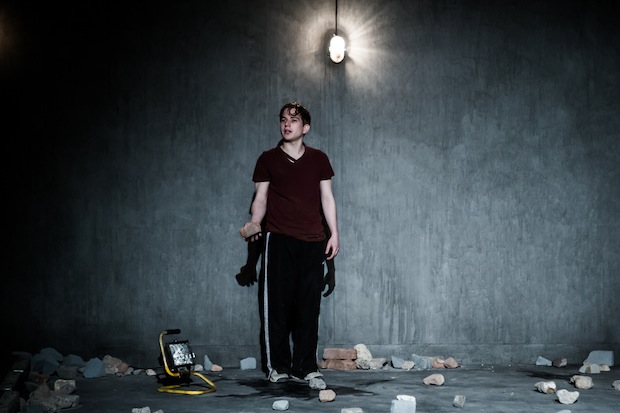Off to the Gate for a special treat: a pious anti-war monologue from the prize-winning American George Brant. Curtain up. And within seconds all my preachy prejudices have fallen apart. The speaker is a female pilot in a jump suit sealed within a see-through cage. Slaying men is her vocation. Interesting!
The story moves with amazing deftness and clarity. She flies missions over Iraq. Loves it. The speed, the jeopardy, the power, the solitude. ‘The blue’ is her term for her intoxicating and deadly haven in the skies. Home on leave, she hits the bars. A one-night stand. She likes the guy. Back in Iraq, she’s pregnant. Skypes him. He weeps with joy. She’s honourably discharged. Back home, they marry. A daughter arrives. She’s settled and fulfilled. But she longs to return to ‘the blue’. Go for it, says hubbie.

Rejoining the air force she finds that her beloved F16s are no longer ‘top shit’. She retrains and gets a job piloting heavily armed drones that survey the Afghan border. ‘The chair force,’ she carps. She works on an air-conditioned base, doing 12-hour shifts, holding a joystick and watching screens that show nothing but sculpted putty. ‘The grey’. She misses the stratosphere, the shared risk, the camaraderie. But when she identifies a group of ‘military age males’ preparing a roadside bomb she feels a rush of the old excitement. Her knuckles whiten around the joystick. A voice in her ear confirms that the targets are ‘guilty’. She fires. Boom. They perish. She watches shorn limbs flying across the scrubland, 10,000 miles away. Guilt, remorse and doubt crowd in on her.
She returns home, having killed, eager to unburden herself to her husband. But she can’t. Regulations. In civilian life she’s under surveillance too. Shopping with her daughter she scans the ceilings for hidden cameras, which are being monitored by outsourced workers in Asia. She imagines an Indian tourist in America rushing to the nearest store and waving to the spy-cams, saying hi to Bangalore.
Her commanders order her to hunt down a major terrorist, the enemy’s number two, nicknamed ‘the prophet’. For many days, she tracks his vehicle across the desert. ‘I’m following the prophet,’ she says with bitter irony. ‘But I am God. And you do not speak for me.’ However, the prophet, like her, has a small daughter. She must choose: spare him or kill him. Either option will devastate her. This is a dazzling and chilling slice of documentary-drama that brims with eloquence and artistry. At its heart lie hideous facts about our closest ally. America is executing the citizens of nations with which it is not at war, on the flimsiest evidence, and often in error. How is that not terrorism? A critic who announces that ‘everyone should see this play’ is bound to appear trite and grandiose but this is an exception. It lasts 65 minutes so you will not be bored. You will be exhilarated, amused, astonished, appalled and horrified. Will you ever forget it? God knows. I won’t.
Dennis Kelly’s 2003 play Debris also strives to produce heightened drama from murderous squalor. Kelly, best known for scripting Matilda, introduces us to a brother and sister living on a tip in London. Homeless, skint and regularly raped by their drunken relatives, they’re also superbly educated and highly articulate. Metaphysical classification is one of their hobbies. Humanity is described as ‘a cluster of bipedal fury’. Words are labelled as ‘increasingly abstract collections of sounds in the air’. The pair interact sparingly. After 30 minutes the boy grabs the girl and tries to asphyxiate her. When she wriggles free he gives her a pint of bleach. ‘Sgood fyuh!’ he explains fondly. ‘Itta killyuh!’ In comedic terms this marks the play’s zenith.

Kelly offers several set-piece portraits of humanity in crisis. The boy explains that he returned home one day to find his house in ruins and his father dangling from a makeshift cross on which he was crucifying himself with a staple gun. Later the boy finds a half-dead baby in a mound of rubble. As he clasps this discovery to his chest, the starving newborn clamps its sharp little jaws around his nipple and sucks out enough of his blood to ensure its survival. That the baby is also the lad’s son — a needless accretion of melodramatic detail — indicates that Kelly has no idea when to put down the trowel. And his characters interest him only as screaming victims or as satirical outsiders performing snotty pastiches of adult cruelty.
The play closes with another effortful tableau. A grandpa cradles a baby to his chest and sobs remorsefully. Hot salty tears baptise the infant’s brow. Alas there wasn’t a wet eye in the house.







Comments